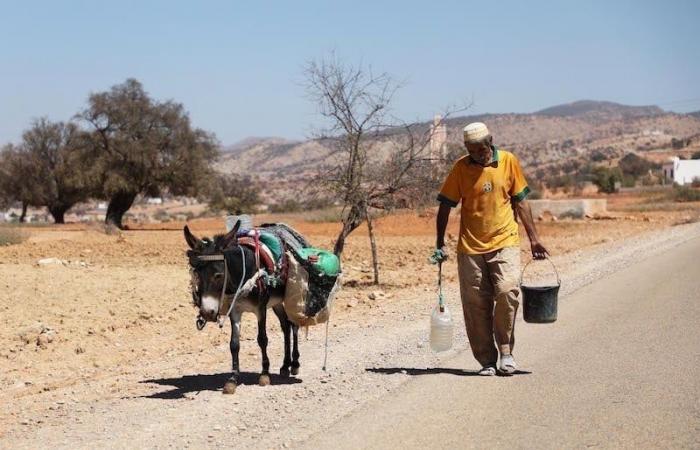Structural failures in water resource management and agricultural strategies are proving to be major obstacles, compromising not only Morocco’s food sovereignty, but also widening the gap of social injustice, reveals a recent study published by the Association for Taxation of Transactions and for citizen action in Morocco (ATTAC Maroc).
For decades, the management of water resources in Morocco has revealed a pronounced classist orientation, particularly noticeable in the agricultural sector, the main consumer of water with usage exceeding 80%. This management plan essentially favors large farmers and irrigated lands, which represent barely 19% of cultivated areas, relegating to second place the vast “bour” lands, which make up more than 80%, specifies the study called “La reality of the management of water resources in Morocco.
The same source underlines that agricultural policies favor crops intended for export, often to the detriment of essential ones such as wheat and legumes. This choice, facilitated by significant tax exemptions and subsidies, mainly benefits large farms and internationally oriented companies, while small farmers and food crops are relegated to the background.
It is also noted that the extensive export of “high value added” agricultural products, such as fruits and vegetables popular with European markets, requires a considerable amount of water, thus exacerbating the critical drought situation in Morocco. Furthermore, the study highlights that the policies in place reinforce this orientation by devoting enormous resources to export agriculture, but by neglecting rain-fed food crops, which constitute nearly 60% of the country’s food production. country.
Despite the considerable impact on water resources and national sovereignty, it appears that the agricultural trade balance continues to show a persistent deficit, with exports covering only 52% of import costs, reports the Association. . During the 2021-2022 campaign, cereal production fell by 69% compared to the previous year, forcing Morocco to import more than half of its cereals, thus making it vulnerable to the vagaries of the global market and climate crises. .
In this sense, ATTAC Maroc urges an overhaul of current policies, advocating the adoption of an agricultural model that values food sovereignty while preserving precious water resources. The association advocates for the restitution of water sources monopolized by private interests and an end to public-private partnerships which have only exacerbated the debt crisis.
In addition, the study highlights that the key lies in a management of water resources which is democratic and benefits from citizen supervision. She insists on the urgent need to compensate communities impacted by the policies put in place and to establish liberating policies that detach themselves from the injunctions of international institutions.
According to the Association, overcoming these challenges requires collective mobilization, both locally and internationally. Furthermore, she believes that the inclusion of farmers and consumers in the process of developing agricultural and water management policies is crucial to developing strategies that are truly participatory and sustainable.






